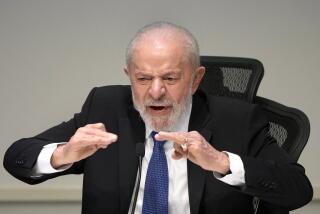NEWS ANALYSIS : Angola’s Election Dispute May Reignite Civil War
- Share via
CAPE TOWN, South Africa — The African nation of Angola teetered on the brink of civil war Tuesday, just two weeks after its first free elections, as South African diplomats tried to dissuade presidential loser Jonas Savimbi from leading his guerrillas back into battle.
Savimbi, the 58-year-old leader of a heavily armed and well-disciplined rebel force, appears ready to renege on his pre-election promise to abide by the results of the balloting. And the uncertainty has spawned sporadic fighting across the country.
No one is sure what Savimbi will do. He can no longer count on the support of the United States or South Africa, his two biggest allies during the 16-year civil war. But he has been playing a dangerous game of political brinkmanship, threatening to resume the war if the final election results are announced before his charges of polling fraud and intimidation are investigated.
Election officials delayed announcement of the results Tuesday, hoping to allow the U.N. observer mission time to look into Savimbi’s allegations of election irregularities and to give diplomats time to carve a way out of the conflict.
“We fear there will be war, if we announce them before the end of the inquiry,” said Gen. Onofre dos Santos, director of the nonpartisan National Election Council. He added that he hoped to call a meeting of all 18 parties that participated in the election.
A special four-person U.N. team was meeting with military, government and rebel officials. But, barring strong new evidence, U.N. officials have said they are prepared to declare the elections “free and fair.”
Those who know Savimbi well are not surprised by his reluctance to graciously accept an election beating. Although he has turned to Western governments for aid in the past, Savimbi has often said that he is beholden to no foreign governments. And his personal style is at once inscrutable and autocratic.
He also is a charismatic national leader who exerts complete control over his army, which has pulled out of the newly formed joint army in protest over the elections and remains well-armed. And if Savimbi gives the word, most analysts believe, his supporters will return to full-scale war.
American diplomats, who backed Savimbi’s National Union for the Total Independence of Angola (UNITA) during the civil war, have bluntly told Savimbi that they will strongly oppose any return to war. And without their support, UNITA has little hope of overthrowing President Jose Eduardo dos Santos, who now can claim to be the elected representative of Angola’s 10 million people.
Savimbi has been publicly silent for more than a week while U.N. officials and foreign diplomats make pilgrimages to his home in Huambo.
South Africa’s foreign affairs minister, Roelof F. (Pik) Botha, flew to Huambo on Tuesday, hoping, he said, “to be received like a brother who can talk with experience.” Earlier, he had met U.N. officials and Dos Santos.
Botha said peace in Angola is crucial to the entire region. “Not one of us (in southern Africa) can afford more conflict,” he said. “There must be a way to avoid further destruction.”
South Africa was a key player in the U.S.-brokered peace accord that ended the civil war and removed 50,000 Cuban troops that had been supporting Dos Santos’ formerly Marxist government. Under the May, 1991, cease-fire agreement, Savimbi and Dos Santos agreed to participate in democratic, multi-party elections.
The South African government has said it would honor the election results and recognize any new government elected by the Angolan people. And analysts believe that Botha, one of Pretoria’s most skilled negotiators, may be in a unique position to persuade his old friend to accept defeat.
More to Read
Sign up for Essential California
The most important California stories and recommendations in your inbox every morning.
You may occasionally receive promotional content from the Los Angeles Times.











